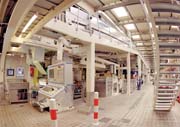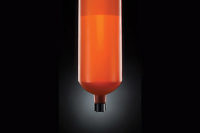
"BASF is the leading chemical company in the world and we felt like we needed to step up and demonstrate leadership," said Joseph C. Breunig, group vice president, Functional Polymers. "I think chemistry touches our lives in so many ways that we need to get the message out that chemistry is a good thing. Therefore, we made the decision to relaunch BASF as ‘The Chemical Company.'"
Breunig says the company also wanted to take the opportunity to refine the BASF logo to signify that the company considers itself a partner, both with customers and society at large. Everyone recognizes the company's North American advertising, ‘We don't make a lot of the products you buy. We make a lot of the products you buy better®'.Our next step is to tell them that BASF is ‘The Chemical Company,'" he says.
Most feedback has been very positive, Breunig says, from both customers and local communities.
"We're excited to get the word out. We feel that chemistry is still a vital part of everybody's life and will continue to be so going into the future."
Breunig says similar perceptions exist in Germany, as well as in the United States.
"I think the perception has varied in Europe as much as it's varied here in North America," he said. "Although there are some negative connotations in Europe regarding chemistry, there are also many positive connotations."
For years, BASF has worked to change this perception, both on a global scale and within local communities. Breunig says they visit high schools and participate in community events to help promote a positive attitude about chemistry.
"I think that you'll see chemical companies raising the level of communication to get the positive messages out about chemistry to a broader audience, including the public in general, to 1.) tell who we are; and 2.) send the message that chemistry is good and essential to our lives."
Heidi Alderman, director of BASF's North American Polymers business, says it's important to note that the company operates safely and efficiently "not because it's been regulated, but because we believe it's the right thing to do.
"It is a good industry and we are essential to everything that we buy, eat, etc. - our modern lifestyle couldn't be possible without chemistry."
Strategies For Success
BASF is investing in new facilities in the United States, not only to meet growing demand, but also to leverage new technology to become more efficient. For example, Breunig says the company will be constructing a new superabsorbent polymer plant in Freeport, TX, that, once completed, will enable BASF to close two older, less efficient facilities in Portsmouth, VA, and Aberdeen, MS."Our strategy is built around places where we believe we can add value both to customers and to society in general," Breunig says. "We take a long-term view of markets and where we want to play. We see ourselves as an innovative company that can solve problems. That vision drives some of the strategies that establish where we plan to grow."
Breunig says companies aren't necessarily investing in Asia to supplant manufacturing capability in North America. Manufacturers like BASF are investing in new facilities in China to meet growing local demand in that country.
There is a tremendous demand in China, and BASF's Verbund site in Nanjing is a $2.9 billion investment. In January 2005, the company's methyl acrylate plant there was the first one to start up at the complex.
While the world's biggest absolute growth potential now lies in China, Breunig warns against taking growth rates too seriously. "The business value in China in terms of dollars or euros is still much smaller than that in North America or in Europe. But, certainly in terms of absolute growth potential, China is important."
Four Elements Of Growth
BASF's goal is to remain the world's leading chemical company. With its BASF 2015 strategy, the company says it will achieve this goal by successfully combining new and proven ideas."That's the strategy that we base all of our activities on," Breunig said. The four key elements are:
1. Earn a premium on cost of capital.
2. Help customers to be more successful.
3. Form the best team in the industry.
4. Ensure sustainable development.
One of the tools the company uses to ensure sustainable development is an eco efficiency analysis that measures the environmental impact, "from cradle to grave," of BASF products vs. other technologies. Developed in 1996 by BASF AG and an external consultant, this tool examines the lifecycle of a product and compares the relative ecological and economic efficiencies of alternative products, production processes, and technologies. BASF recently used this tool in the development of a product for the asphalt-paving market.
"We developed polymers that are added to asphalt to make roads longer lasting and more resilient," Alderman said. "We've also worked with paving contractors and asphalt manufacturers in developing new processes to pave roads. Rather than ripping up a road in, let's say, 10 years because it's in bad shape, you could just repave using thin layers, called microsurfacing, every couple of years and significantly extend the service life of the road at lower total cost."
Another project that uses BASF latex technology is the concrete bridge decking of the new Cooper River Bridge in Charleston, SC. This bridge, North America's longest cable-stay span bridge, will replace two existing bridges that are functionally obsolete. The BASF latex helped create a strong yet flexible bridge deck surface that will hold up much longer, Breunig said. This bridge opened on July 16. Those are the types of things, he said, that BASF works on and that demonstrate how the company is looking at total value.
Advances In Adhesives
An adhesives-specific example that fits under the "help our customers to be more successful" category is the installation of a pilot coating machine in the Ludwigshafen research center, Breunig said. The world's fastest coater, the machine allows manufacturers of self-adhesive products (such as adhesive tapes or labels) to test ways to optimize their manufacturing processes and output. It boasts a maximum speed of up to 5,000 feet per minute for water-based adhesives, and up to 2,300 feet per minute for UV-curable hot-melt adhesives."We are more flexible now," Alderman said. "We can vary the interaction between coating head, machine speed, carrier and pressure-sensitive adhesive to a greater extent than ever before. In addition, development and commercialization time lines will be significantly reduced as a result of experience gained and information developed using this new equipment."
BASF also developed a new polymer for pressure-sensitive labels that meets the requirements at a range of temperatures. The new adhesive can be used for labels that have different temperature requirements, such as those stored in freezers or refrigerators, or room-temperature applications.
"In addition to developing specific adhesives for unique applications, we're also working to develop polymers that can be used in multiple applications," Alderman says. "That is, to make our customers more successful by developing better and more cost-effective products for them. "These multi-purpose products could enable tremendous reduction in inventory of the adhesives themselves, as well as label types.
"We're constantly working with our customers to develop products that can, for example, be used over a broader range of applications," she says. "One of our best-selling products is called Acronal V210. We sell it to a number of label manufacturers in its neat form, or we supply it in coater-ready form by adding tackifiers and other additives to it for general-purpose applications."
Looking Ahead
"I think BASF is positioned very, very well," Breunig said, "because we are organized along value chains and we have a significant amount of backward integration in these value chains. Although others have had problems sourcing materials, we have not had any supply interruptions, and this has been fortunate for our customers."Last year, BASF was the only acrylic monomer supplier not to have a force majeur situation at some point during the year. We think that's quite an advantage we have to offer, including to adhesives customers because all the raw materials for the adhesives products that we produce are sourced internally."
"As the leading chemical company, we're investing in many parts of the chemical chain," Alderman says, "from basic commodity chemicals to new specialty products that are used in consumer applications. We're committed to the chemical industry."
"It all ties back to our brand position as ‘The Chemical Company,'" Breunig said.
